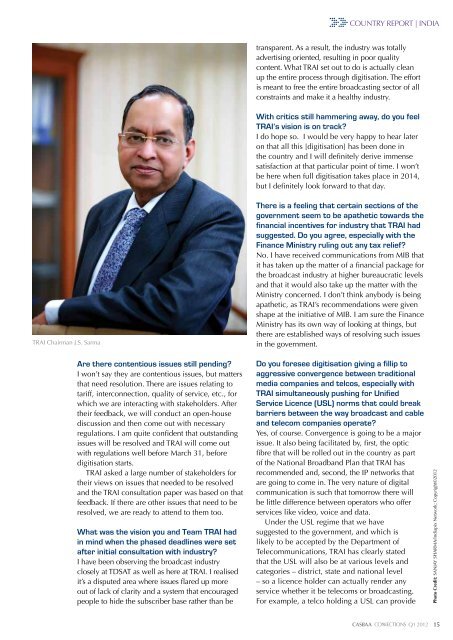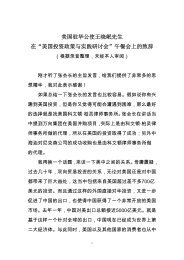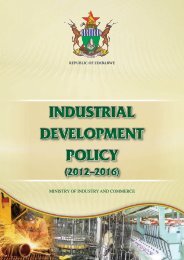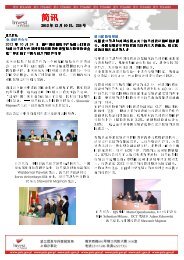Read More - Chinagoabroad
Read More - Chinagoabroad
Read More - Chinagoabroad
Create successful ePaper yourself
Turn your PDF publications into a flip-book with our unique Google optimized e-Paper software.
TRAI Chairman J.S. Sarma<br />
Are there contentious issues still pending?<br />
I won’t say they are contentious issues, but matters<br />
that need resolution. There are issues relating to<br />
tariff, interconnection, quality of service, etc., for<br />
which we are interacting with stakeholders. After<br />
their feedback, we will conduct an open-house<br />
discussion and then come out with necessary<br />
regulations. I am quite confident that outstanding<br />
issues will be resolved and TRAI will come out<br />
with regulations well before March 31, before<br />
digitisation starts.<br />
TRAI asked a large number of stakeholders for<br />
their views on issues that needed to be resolved<br />
and the TRAI consultation paper was based on that<br />
feedback. If there are other issues that need to be<br />
resolved, we are ready to attend to them too.<br />
What was the vision you and Team TRAI had<br />
in mind when the phased deadlines were set<br />
after initial consultation with industry?<br />
I have been observing the broadcast industry<br />
closely at TDSAT as well as here at TRAI. I realised<br />
it’s a disputed area where issues flared up more<br />
out of lack of clarity and a system that encouraged<br />
people to hide the subscriber base rather than be<br />
COUNTRY REPORT | INDIA<br />
transparent. As a result, the industry was totally<br />
advertising oriented, resulting in poor quality<br />
content. What TRAI set out to do is actually clean<br />
up the entire process through digitisation. The effort<br />
is meant to free the entire broadcasting sector of all<br />
constraints and make it a healthy industry.<br />
With critics still hammering away, do you feel<br />
TRAI’s vision is on track?<br />
I do hope so. I would be very happy to hear later<br />
on that all this [digitisation] has been done in<br />
the country and I will definitely derive immense<br />
satisfaction at that particular point of time. I won’t<br />
be here when full digitisation takes place in 2014,<br />
but I definitely look forward to that day.<br />
There is a feeling that certain sections of the<br />
government seem to be apathetic towards the<br />
financial incentives for industry that TRAI had<br />
suggested. Do you agree, especially with the<br />
Finance Ministry ruling out any tax relief?<br />
No. I have received communications from MIB that<br />
it has taken up the matter of a financial package for<br />
the broadcast industry at higher bureaucratic levels<br />
and that it would also take up the matter with the<br />
Ministry concerned. I don’t think anybody is being<br />
apathetic, as TRAI’s recommendations were given<br />
shape at the initiative of MIB. I am sure the Finance<br />
Ministry has its own way of looking at things, but<br />
there are established ways of resolving such issues<br />
in the government.<br />
Do you foresee digitisation giving a fillip to<br />
aggressive convergence between traditional<br />
media companies and telcos, especially with<br />
TRAI simultaneously pushing for Unified<br />
Service Licence (USL) norms that could break<br />
barriers between the way broadcast and cable<br />
and telecom companies operate?<br />
Yes, of course. Convergence is going to be a major<br />
issue. It also being facilitated by, first, the optic<br />
fibre that will be rolled out in the country as part<br />
of the National Broadband Plan that TRAI has<br />
recommended and, second, the IP networks that<br />
are going to come in. The very nature of digital<br />
communication is such that tomorrow there will<br />
be little difference between operators who offer<br />
Copyright©2012<br />
services like video, voice and data.<br />
Under the USL regime that we have<br />
Network;<br />
suggested to the government, and which is<br />
likely to be accepted by the Department of<br />
Telecommunications, TRAI has clearly stated<br />
SHARMA/Indiapix<br />
that the USL will also be at various levels and<br />
categories – district, state and national level<br />
SANJAY<br />
– so a licence holder can actually render any<br />
service whether it be telecoms or broadcasting.<br />
Credit:<br />
For example, a telco holding a USL can provide Photo<br />
CASbAA Q1 2012 15










